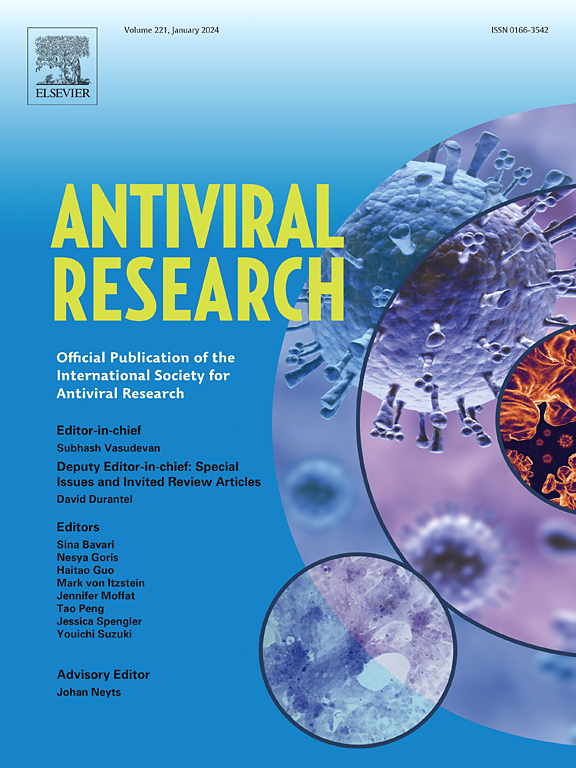Salicylamide derivative JMX0312 protects immunosuppressed Syrian hamsters against adenovirus lethal challenge
IF 4.5
2区 医学
Q1 PHARMACOLOGY & PHARMACY
引用次数: 0
Abstract
Despite the fact that human adenovirus (HAdV) causes severe infections in immunosuppressed and immunocompetent individuals, especially in children, there is currently no specific treatment for these infections. Previously we reported a new salicylamide analogue, JMX0312, as a potent inhibitor of HAdV infection with low cytotoxicity in vitro. Here we evaluate the in vivo efficacy and safety of this molecule in the immunosuppressed Syrian hamster model of HAdV infection. JMX0312 administration at a dose of 6.25 mg/kg did not affect the body weight of the animals, and reduced the viral load in liver and blood in a similar way than cidofovir. Also, JMX0312 reduced the mortality of the animals, although in a lesser extent than cidofovir, a drug used to treat these infections that must be subject to rigorous monitoring due to its high toxicity and whose used is not approved in children. Our findings highlight the potential of this new antiviral agent for the treatment of HAdV infections, paving the way for future pre-clinical and clinical trial development towards a safer and more effective treatment against HAdV-associated infections.
水杨胺衍生物JMX0312保护免疫抑制的叙利亚仓鼠免受腺病毒致命攻击
尽管人类腺病毒(HAdV)会导致免疫抑制和免疫功能健全的个体(尤其是儿童)发生严重感染,但目前还没有治疗这些感染的特效药物。此前我们曾报道过一种新型水杨酰胺类似物 JMX0312,它是一种有效的 HAdV 感染抑制剂,体外细胞毒性低。在此,我们评估了该分子在免疫抑制的叙利亚仓鼠 HAdV 感染模型中的体内疗效和安全性。以 6.25 毫克/千克的剂量给药 JMX0312 不会影响动物的体重,与西多福韦相比,JMX0312 可减少肝脏和血液中的病毒载量。此外,JMX0312还降低了动物的死亡率,但降低的程度低于西多福韦酯。西多福韦酯是一种用于治疗此类感染的药物,因其毒性高而必须接受严格的监测,而且不允许用于儿童。我们的研究结果凸显了这种新型抗病毒药物在治疗 HAdV 感染方面的潜力,为今后的临床前和临床试验开发铺平了道路,以便更安全、更有效地治疗 HAdV 相关感染。
本文章由计算机程序翻译,如有差异,请以英文原文为准。
求助全文
约1分钟内获得全文
求助全文
来源期刊

Antiviral research
医学-病毒学
CiteScore
17.10
自引率
3.90%
发文量
157
审稿时长
34 days
期刊介绍:
Antiviral Research is a journal that focuses on various aspects of controlling viral infections in both humans and animals. It is a platform for publishing research reports, short communications, review articles, and commentaries. The journal covers a wide range of topics including antiviral drugs, antibodies, and host-response modifiers. These topics encompass their synthesis, in vitro and in vivo testing, as well as mechanisms of action. Additionally, the journal also publishes studies on the development of new or improved vaccines against viral infections in humans. It delves into assessing the safety of drugs and vaccines, tracking the evolution of drug or vaccine-resistant viruses, and developing effective countermeasures. Another area of interest includes the identification and validation of new drug targets. The journal further explores laboratory animal models of viral diseases, investigates the pathogenesis of viral diseases, and examines the mechanisms by which viruses avoid host immune responses.
 求助内容:
求助内容: 应助结果提醒方式:
应助结果提醒方式:


